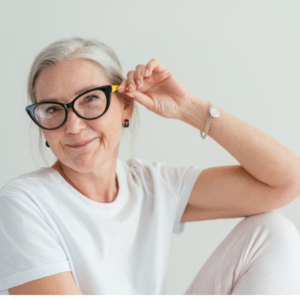Facial Aging: How To Make Sense Of All The Potions And Procedures

Facial Aging: How To Make Sense Of All The Potions And Procedures
February 1, 2023
It’s challenging enough to keep adding candles to the cake each year. But to then also feel shame or guilt or anxiety because your face reflects those many years feels deeply unfair. It’s largely an artifact of marketing departments for beauty products and a culture that celebrates a false facade of what an older person should ideally look like. While we all want to feel and look our best, does that also include distorting our features or undergoing invasive procedures just so that we can coincide with some unattainable (and deeply flawed) notion of how a 60 or 70, or 80-year-old is supposed to look? Maybe it’s time we cut ourselves some slack and approach our facial aging with compassion rather than criticism. In fact, there are now some courageous voices coming out to do just that.
For example, a recent campaign by the cosmetics brand Laura Geller features the reality television personality Bethenny Frankel who agrees to a “reverse photoshop” image that not only reveals her current facial lines and creases but enhances and expands them as they are likely to appear in years to come. As Frankel says in the commercial, “A wrinkle here or there isn’t the end of the world and it’s about time we stop filtering, photoshopping, and portraying a false image and social media messaging.” That’s certainly a contrarian (and more compassionate) view of getting older and growing to accept it. Acceptance and compassion are also the language of beauty writer Valerie Monroe, who was the beauty director for O, the Oprah Magazine, for 16 years, and now writes her own newsletter under the provocative but wise title, How Not To F*ck Up Your Face. Receiving no cut or monetary benefit from the products she writes about, Monroe is on a quest to give older women permission to age in a “good enough” way. That is, as she says herself, her “goal continues to be to shift our thinking in the beauty arena from self-criticism to self-compassion and to learn how to be loving witnesses to ourselves and one another as we age.” While she doesn’t reject all cosmetic procedures (she’s not judgmental that way) she suggests we allow ourselves some baby steps to permit ourselves to gradually accept our aging faces rather than be a slave to some impossible beauty goal.
Along those lines, the Wall Street Journal recently ran an article that suggested we “Skip The Plastic Surgery and Age “Intentionally” With Kinder Treatments.” As one expert quoted in the article stated, “Rather than fighting natural aging, we’re embracing it- with a little help from technology.” The article went on to discuss some of the “kinder” treatments now available, including fractional lasers, ultrasound, and micro-needling. In fact, there’s a new treatment on the horizon for those who are waffling about Botox. According to a study in Nature Biomedical Engineering, research out of the University of Texas is focusing on DNA injections to rid aging skin of some wrinkles and boost collagen production without the side effects of such treatments as Botox shots. You can read more about this study here.
Similarly, when it comes to skin potions and lotions, marketing departments for cosmetic companies focus on our aging anxiety rather than our acceptance and embrace of our aging faces. As dermatologist Jules Lipoff recently said in an article in the Philadelphia Inquirer, “The skin care industry has taken advantage of our collective anxiety about aging and convinced us that we should be doing more when what we should be doing is less.” So just as consumers may be turning away from invasive (and distorting) plastic surgery, he urges those of us in our later years to focus on a few basic products, and avoid wasting our money (and possibly irritating our skin) with products that have no scientific basis to their claims. As he reminds us, 60% of our skin appearance is due to genetics. Regarding environmental exposures (sun and smoking), wear your sunscreen (!), don’t smoke, and if needed, try a topical Vitamin A (retinoids) that actually does have scientific evidence to back up its wrinkle-reducing claims.







